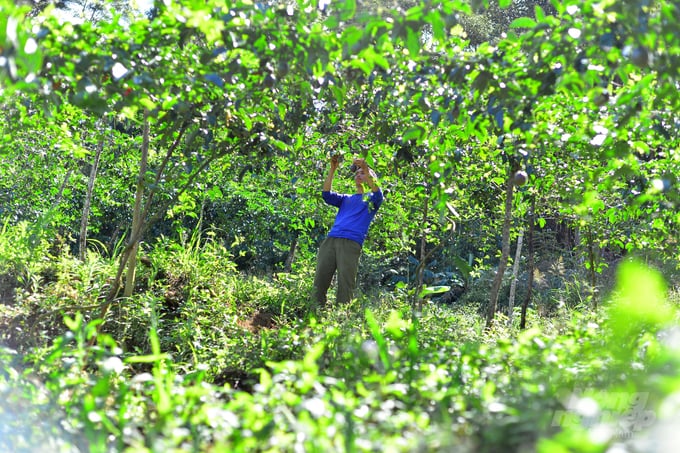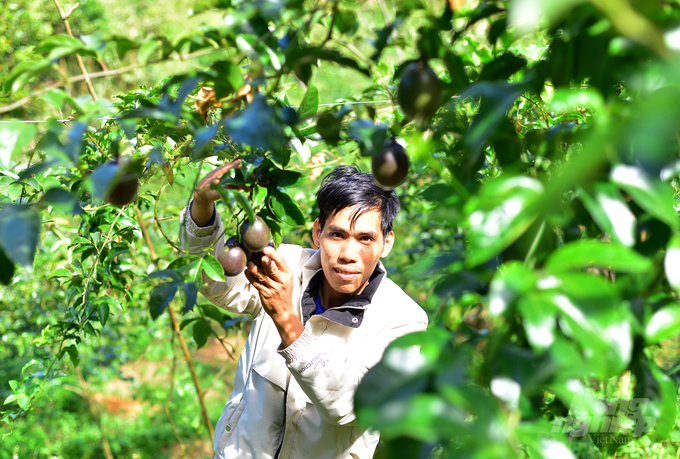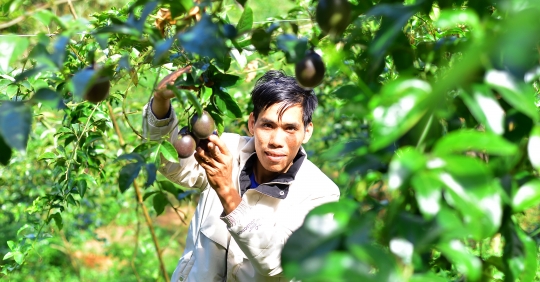Previously, the life of Mr. Vay Sy Quan’s family (Chinese ethnic group living in Da Chais Municipality) depended entirely on coffee production. Therefore, when the price of coffee fell, his family faced many difficulties. In 2021, for economic development, Mr. Quan studied and imported passion fruit varieties of a unit in the province for cover crop cultivation on coffee gardens. So far, the area of passion fruit mixed with coffee has been expanded to 0.6 ha.
After only 1 year of sowing, passion fruit thrives and gives harvest. Mr. Quan shared that his family now harvests passion fruit every month and sells it to a local company at a price of VND 14,000/kg. “The garden is newly planted, but 6-7 tons of fruit are harvested every month. Thanks to the passion fruit, the family’s economy has improved, there is a source of income every month,” said Mr. Vay Sy Quan, adding that his family has now rented an additional 0.6 ha garden from a household in the area expansion.

The model of growing passion fruit infused with coffee has helped many households in Da Chais Township (Lac Duong District, Lam Dong) improve their income and become wealthy. Picture: Min Hau.
Like Mr. Quan’s family, Mr. Trinh Xuan Truong’s family currently has a stable income from the passion fruit blended with coffee model. At the end of 2020, when Truong saw that the development of coffee and persimmon trees was facing many difficulties due to volatile prices, he found a new direction. He went to a facility specializing in providing passion fruit seeds in Duc Trong District (Lam Dong) to learn and buy seeds for trial planting in an area of 2 ha of garden.
Mr Truong said Da Chais land has an altitude of over 1,600m above sea level, the climate is cool, the soil is suitable for passion fruit, so the seedlings that are made to grow grow very quickly. In particular, the tree is less affected by pests and diseases. Mr. Truong said, “The Da Chais area has regular rainfall and good humidity, so the family does not have to water it all year round. After 1 year of sowing, passion fruit thrives and gives harvest.
According to Mr. Truong, his family built a grid of chicken wire and wire tie systems parallel to the cafes to allow the passion fruit to grow well. With this mixed culture model, the coffee is shaded on the ground, the soil stores moisture so that the plant can thrive. In return, the passion fruit also enjoys excess fertilizer from coffee. Currently, Truong’s family regularly harvests 10 tons of fruit per pole (1,000 m2) every month.
Trinh Xuan Truong shared, “The family produces passion fruit using the VietGAP process and organic farming, so the product is highly appreciated. Currently, the whole family’s passion fruit is consumed by one unit for VND 14,000/kg. Every year, after deducting costs, 1 ha of passion fruit brings the family a net profit of VND 500 million.

Every month, 1 Sao (1,000 m2) of passion fruit for Trinh Xuan Truong’s family harvests 10 tons of fruit. Picture: Min Hau.
According to Truong, in the coming period, his family will further expand the area and focus on high-tech manufacturing to enhance product value. At the same time, you cooperate with processing companies in the province for sustainable development.
Mr. Vu Hoang Dang Khoa, Chairman of the Da Chais Township Farmers’ Association, said that in 2022, realizing that the passion fruit model of interim coffee cultivation achieved high productivity and economic efficiency, the township farmers’ association gathered farmers and a professional association Fruit growers built with passion to promote production contexts. Currently the association has about 35 members (most of them are from ethnic minorities) with a total area of about 20 hectares.
“The local passion fruit model brings high economic efficiency and helps people improve their sources of income and have the opportunity to become rich. Therefore, the local government encourages people to expand the production linkage model and expand the market,” Khoa said, adding that in the past, the association’s members have been encouraged by the agricultural sector. In particular, local technical support in the production of the agricultural Lam Dong Province Advisory Center that teaches the process of growing and caring for passion fruit in the garden.
According to the Da Chais Municipality People’s Committee, in the coming period, the Lac Duong District Farmers’ Union will network with provincial and city farmers’ unions to cooperate with passion fruit processing plants and find stable production for lemon products. In addition, the district is also striving to establish cooperative groups for passion fruit production with the local brand.

